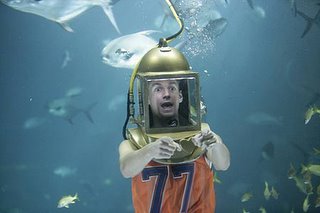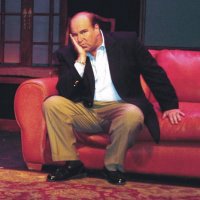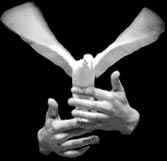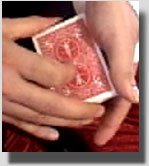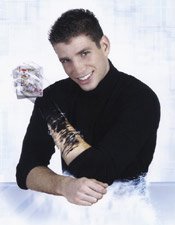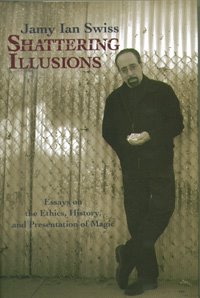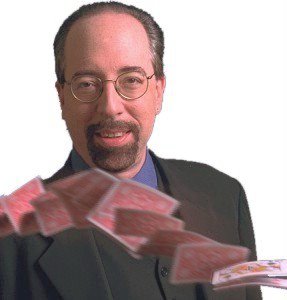Great Magic Reads #2. "Conjure Times"
Question: Who was the first American born professional magician?
I bet you’ll never get this one.
Give up? (You are gonna love this.)
The first American born professional magician was a man named Richard Potter.
Richard Potter was the son of a slave.
And yes, he was black. (Bet you didn’t see that one coming?)
Richard Potter was born on the country estate of Sir Charles Henry Frankland. His mother, Dinah, was born in Africa and kidnapped by Dutch slave traders and purchased by Sir Henry in Boston. It is possible that Richard was actually the son of Sir Richard because he was of mixed race.
At the age of ten Richard signed on to be a cabin boy with a Captain Skinner but only worked one Atlantic crossing. Arriving in Liverpool Richard accepted his pay and told the Captain that the life on the sea was not for him.
Not long afterwards he stumbled upon a fair and was taken by a Scottish ventriloquist and magician named John Rannie, who just happened to need an assistant. They traveled Europe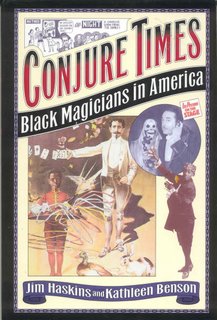 together until the year 1800 when they went to America.
together until the year 1800 when they went to America.
To make a long story short, they toured America until 1810, when Rannie told the crowd of his show that he would soon return to Scotland and Richard Potter would take over his show. In January 1810 the two performed together for the last time and on November 2, 1811 Richard Potter, a son of a slave, became the first American born professional magician.
By the time he died at age 52 in 1835, he had toured America, purchased a farm, married and had three children and lived a comfortable life.
Interesting, huh?
This story begins the fascinating book Conjure Times: Black Magicians in America by Jim Haskins and Kathleen Benson. A book filled with stories of successful magicians, many whose names have been lost to history. A read through this book is a fascinating history of entertainers who were considered of an inferior race but making successful lives and influencing others.
Let’s take the case of one Fetaque (pronounced “Fee-take”) Sanders. Grandson of sharecroppers, son of an insurance salesman with influential ties in Nashville, Fetaque volunteered at a magic show at the tender age of 9 and was instantly hooked. At age twenty he left Nashville to find his own way and became a successful magician as well as a very popular “Spook Show” operator. His influence is found today in the works of Sammy Smith, just to name one.
Then there is Charles Green The Third. Quite possibly the most successful trade show magician around today. How about Clarence “Chandu” Hunter who, while being a success on his own, was also responsible for starting out the careers of Jack “Goldfinger” Vaughn (No, the other Goldfinger) and a young boy named Arsenio Hall.
Of course, you cannot have a book about Black Magicians without mentioning David Blaine. (Although he claims at time to be Puerto Rican, or of Russian/Italian descent.)
Conjure Times: Black Magicians in America by Jim Haskins and Kathleen Benson is a stunning book, filled with stories of magicians who should be more well known than they are. An interesting notion in the book is that these men, as performers, were also very popular with white audiences. (Interesting, huh?) This is a lost history of Magic and a must read for anyone who wants the full picture of the depth of American Conjuring.
Conjure Times: Black magicians in America is available from Amazon.com by clicking HERE. Amazon.ca by clicking HERE. Through Abebooks by clicking HERE.
I bet you’ll never get this one.
Give up? (You are gonna love this.)
The first American born professional magician was a man named Richard Potter.
Richard Potter was the son of a slave.
And yes, he was black. (Bet you didn’t see that one coming?)
Richard Potter was born on the country estate of Sir Charles Henry Frankland. His mother, Dinah, was born in Africa and kidnapped by Dutch slave traders and purchased by Sir Henry in Boston. It is possible that Richard was actually the son of Sir Richard because he was of mixed race.
At the age of ten Richard signed on to be a cabin boy with a Captain Skinner but only worked one Atlantic crossing. Arriving in Liverpool Richard accepted his pay and told the Captain that the life on the sea was not for him.
Not long afterwards he stumbled upon a fair and was taken by a Scottish ventriloquist and magician named John Rannie, who just happened to need an assistant. They traveled Europe
 together until the year 1800 when they went to America.
together until the year 1800 when they went to America.To make a long story short, they toured America until 1810, when Rannie told the crowd of his show that he would soon return to Scotland and Richard Potter would take over his show. In January 1810 the two performed together for the last time and on November 2, 1811 Richard Potter, a son of a slave, became the first American born professional magician.
By the time he died at age 52 in 1835, he had toured America, purchased a farm, married and had three children and lived a comfortable life.
Interesting, huh?
This story begins the fascinating book Conjure Times: Black Magicians in America by Jim Haskins and Kathleen Benson. A book filled with stories of successful magicians, many whose names have been lost to history. A read through this book is a fascinating history of entertainers who were considered of an inferior race but making successful lives and influencing others.
Let’s take the case of one Fetaque (pronounced “Fee-take”) Sanders. Grandson of sharecroppers, son of an insurance salesman with influential ties in Nashville, Fetaque volunteered at a magic show at the tender age of 9 and was instantly hooked. At age twenty he left Nashville to find his own way and became a successful magician as well as a very popular “Spook Show” operator. His influence is found today in the works of Sammy Smith, just to name one.
Then there is Charles Green The Third. Quite possibly the most successful trade show magician around today. How about Clarence “Chandu” Hunter who, while being a success on his own, was also responsible for starting out the careers of Jack “Goldfinger” Vaughn (No, the other Goldfinger) and a young boy named Arsenio Hall.
Of course, you cannot have a book about Black Magicians without mentioning David Blaine. (Although he claims at time to be Puerto Rican, or of Russian/Italian descent.)
Conjure Times: Black Magicians in America by Jim Haskins and Kathleen Benson is a stunning book, filled with stories of magicians who should be more well known than they are. An interesting notion in the book is that these men, as performers, were also very popular with white audiences. (Interesting, huh?) This is a lost history of Magic and a must read for anyone who wants the full picture of the depth of American Conjuring.
Conjure Times: Black magicians in America is available from Amazon.com by clicking HERE. Amazon.ca by clicking HERE. Through Abebooks by clicking HERE.


